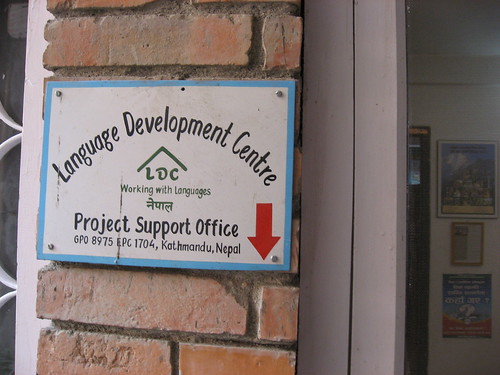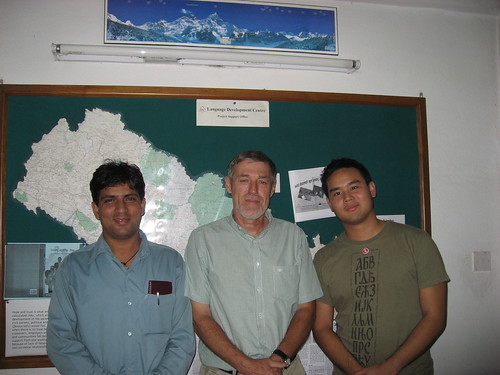For this special 200th post, I thought I'd cover something that I had the joy and honour of organising and running in Zunheboto last week. It was the very first Sumi Mother Tongue Literacy Development Workshop. The workshop ran from 23 Oct 2012 till 26 Oct 2012, and was conducted by the North East Literacy Network, represented by Palash Nath and Luke Horo, with the support of SIL International and also our wonderful benefactors in Melbourne, Inotoli Zhimomi and Nick Lenaghan.
Our very humble hand-written notice on the white board
It was hosted by the Sumi Literature Board and held at the Sütsah Academy in Zunheboto.
This workshop was meant to be a first step towards teaching Sumi as a subject in the private schools in Zunheboto (which mostly use English as the medium of instruction), with the further possibility of teaching content subjects in Sumi, along with a gradual transition to English. The philosophy here is that children learn better through a language they are familiar with. Importantly, they also learn to read and write more quickly in a language that they already know.
The second aim was to look at ways to develop a syllabus throughout the whole year. Here, the concept of a 'cultural calendar' was introduced, to get teachers to think about what the children are experiencing in the real world during every part of the calendar year, and using that to build the syllabus. Again, the focus is on moving from the familiar to the unfamiliar. This can then lead to 'reintroducing' children to more traditional practices that are no longer being transmitted from the older generation, and can serve as a kind of cultural revitalisation.
Participants on the 2nd day of the workshop. 2nd and 3rd from the left: Scato Swu and Hokishe Yeptho (Sumi Literature Board)
About half of the workshop was spent on producing materials that children would be able to enjoy. Other materials included: primers, riddle books, rhymes, posters depicting scenes familiar to them. Younger ones may not necessarily be able to read the words in the story books, but the pictures should be able to help them (and older non-literate speakers of the language) follow the story.
Here we have some teachers (along with the talented Mr Toino) writing and illustrating their own childrens' books.
Within just 4 days, the teachers managed to produce 10 books! Of course, they still need to be checked for spelling, grammar and punctuation, and also tested with children to see if the language used is appropriate, whether the pictures are able to tell the story etc. They will also eventually need to be graded by target age of the reader.
The teachers told us that the books they were working on at home generated a lot of interest and excitement amongst their families and neighbours. This is the kind of excitement we hope to continue to generate, as people see their language written down in formats they are not used to.
At the end of last day, the workshop facilitators were presented with these lovely traditional Sumi shawls / aqhumu. Technically, I think this particular shawl used to be worn only by men who had killed a mithun / avi / Indian bison. But I suppose nowadays it could be a symbol of any kind of accomplishment.

From L to R: Luke Horo; myself; Jekügha Assümi (principal, Step by Step School); H S Rotokha; Nihoshe Jimomi (Sumi Literature Board); Palash Nath.
A VERY big thank you to the hosts, especially to H S Rotokha who came every single day for the duration of the workshop. And to the teachers: Sharon K Jimo, Aghatoli Jimo, Aviholi Kiba, Atoyi Awomi and Amento Achumi. Also special thanks to Toino, for helping us with the illustrations and kindly acting as our driver.
If you're Sumi and would like to help out with this project, please get in touch by leaving a comment below, or by contacting the Sütsah Academy. This is a long-term project that requires a lot of community support. We need people to come up with more stories - you may also want to ask your parents / grandparents for more traditional stories to draw inspiration from. We need people to do illustrations. We need people to help train others to create new materials, with the possibility for some people to be sent to Guwahati and elsewhere in India to receive further training from international and local experts.
Most importantly, we need people to advocate for the use of Sumi in schools, at least in the Zunheboto district where Sumi is the predominant language used in households. We are certainly aware of the need for English (and possibly Hindi) to get a job in India, but what we are trying to make people understand is that by introducing English through the mother tongue, children can actually go further (than simply parroting what is being taught in class and regurgitating it during exam time).









